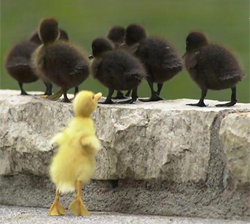As of last weekend, our house has been slowly disappearing into boxes all around us. We still have another three weeks until we move, but because I’ll be busy with conferences the next few weekends, we’ve had to get a jump start on the packing. Perhaps the hardest part about the move has been parting with all my writing books/supplies/knick-knacks (even if just for a few weeks). This is where the Portacle comes in.
Portacle = Portable + ORACLE.
As some of you may recall, the ORACLE (along with my special writing space) is where I keep my miscellaneous writing ideas, prompts and exercises. But alas, my beautiful workspace and containers of treasure are slowly disappearing into boxes and I’ve had to ask the tough question: which parts of my workspace can I absolutely NOT live without for the next three weeks?
Here’s my list:
For Writing
- Journal (unlined)
- Stickers
- mini Image File (a couple of postcards tucked into the journal)
- Who/What/When/Where/Why/How question cards
- Small velvet drawstring baggie containing dice, worry stone and beaded charm
For Reading
- Kindle
- Amazon gift card (Christmas gift – to be used only in literary emergencies… like if I run out of things to read between now and February)
- The Iliad (Fagles translation) for some light reading or to cure insomnia, not sure which
For Teaching
- The Art of the Short Story (the textbook for the class I’m teaching)
- Strunk & White (duh)
- Ordinary Genius by Kim Addonizio
- Reading Like a Writer by Francine Prose
- Good Poems by Garrison Keillor
- Two books on craft (one poetry, one fiction)
- Graphic Novel version of Pride and Prejudice (because I can’t survive without at least one version of my favorite book)
I can’t tell you how much it has pained me to store away my books. On Writing (Stephen King). Writing Down the Bones (Natalie Goldberg). Bird by Bird (Anne Lamott). I mean, it’s almost like taking your friends and squashing them into boxes. It’ll be three whole weeks (or longer) before I see any of their shiny, smiling covers again.
But hubby put his foot down and said I had to pack the books. Either that, or the movers wouldn’t take them and I was going to have to move the books to the new place all by myself. (I hate it when he makes sense and sounds reasonable.)
Still. All these empty bookshelves make me feel so darn lonely.
Guess what I’m unpacking first when we get there! 🙂










 Call me Gabi (pronounced gah-BEE). I'm a writer, freelance teacher, and a lover of books and words. I'm also the instigator of DIY MFA. iggi's my sidekick, but he thinks he's the brains behind this operation.
Call me Gabi (pronounced gah-BEE). I'm a writer, freelance teacher, and a lover of books and words. I'm also the instigator of DIY MFA. iggi's my sidekick, but he thinks he's the brains behind this operation.
 ROW80 Check-In (4)
ROW80 Check-In (4) YA Cafe Book Club: The Unbecoming of Mara Dyer
YA Cafe Book Club: The Unbecoming of Mara Dyer YA Cafe: Building Suspense
YA Cafe: Building Suspense